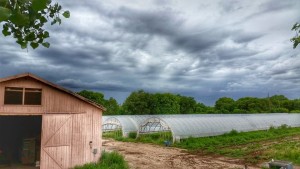
First off this wet morning, members’ feedback on leasing land. I got a few emails that brought up the issue of how we get leased land certified Organic. It is an important question and one that I left out of the newsletter last week. Honestly, I think that I left it out because I take it for granted. Currently, all of the land that we own and lease, we have certified Organic. And this will not change moving forward. We are dedicated to this.
We act as stewards of the land on all of our fields whether they are owned or leased. We do not treat our leased land as rented mules and our owned fields with baby gloves. All of our dirt gets the same TLC of cover crops, Organic fish fertilizers, and crop rotation. We do this because it is good for the land, but also because when you take care of the land, the land takes care of you and your crops.
Sometimes I hear people say “But you’re Organic, I thought that meant you do not use fertilizers??” This could not be further from the truth. We just use ground up fish and kelp and not powders from a warehouse.
Farming by its nature is a mining activity. It is not very sexy to think of it like that, but we mine vitamins, water, and nutrients from our fields every harvest. When you stand next to a pallet of tomatoes, you realize the nutrients that we are sending from our fields to your kitchen. Those nutrients must be returned to the soil or the system would collapse.
Now on to the rains and the farm. Without fail, whenever the rains come to town, I have folks ask me if I am so happy for the rains? And my answer is probably not what they expect—no, I am not all that happy with getting monsoons on the farm. Before you yell at me, let me explain why this is the case.
Our farm/your farm is not a dryland farm. The family farm in North Dakota is a dryland farm. “Wait Farmer M., what the heck is a dryland farm? You’re losing me dude.” Oh yes, dryland means that the farm has no supplemental irrigation. Whatever Mother Nature gives you from the sky is all you get. For better or for worse.
On our farm, we have irrigation wells to water the crops. We do not rely on rain for irrigation. When our plants need a drink, we turn on the well and water them. So what does the rain do then if it does not water crops?
Well, it creates mud and gets the plants wet and you know what plants hate? Getting wet. Fungi and bacteria need moisture to thrive. Most plant pathogens are either a fungus or a bacteria (or a gopher). So when your plants get too wet, you keep your eyes peeled for sick plants. And that is where we are at now. The rains have wreaked havoc on our summer squash and are making carrot harvests feel more like we are harvesting rice.
Thankfully all of our tomatoes are in protective greenhouses to keep this water off their backs. If it was not for these greenhouses I would think that we would lose our whole tomato crop. My outdoor tomatoes at my house look like heck from all the moisture. So if your garden does too, this is why.
With all of that said, the rains are great at cooling off the earth like a giant swamp cooler. So our fall plantings of lettuce, roots, etc will be almost a month earlier than a typical hot dry summer. That is the lemonade we are trying to make at least.
The rains are also wonderful for quenching a dry earth. The Southwest needs it and so I take my own issues of our waterlogged farm with a grain of salt. I mean after all we signed up to farm, no one forces us to do it. And all of the weather craziness keeps Mother Nature mysterious. Which is another thing that I love about it. Never a dull moment.
So that is a nutshell of how the rains are affecting your farm. All in all I think we are in a pretty good place, but definitely not all roses. We are getting some thorns too.
Farmer Monte